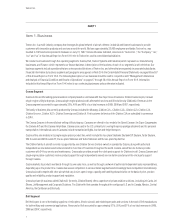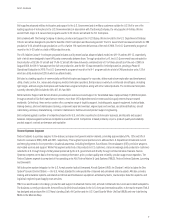E-Z-GO 2009 Annual Report Download - page 20
Download and view the complete annual report
Please find page 20 of the 2009 E-Z-GO annual report below. You can navigate through the pages in the report by either clicking on the pages listed below, or by using the keyword search tool below to find specific information within the annual report.
11
Textron Inc.
acceptable prices and terms and in a timely manner. We also may underestimate the costs of retained liabilities or indemnification obligations. In
addition, unanticipated delays or difficulties in effecting acquisitions or dispositions may divert the attention of our management and resources
from our existing operations.
Failure to perform by our subcontractors or suppliers could adversely affect our performance.
We rely on other companies to provide raw materials, major components and subsystems for our products. Subcontractors also perform services
that we provide to our customers in certain circumstances. In addition, we outsource certain support functions, including certain global
information technology infrastructure services to third-party service providers. We depend on these vendors, subcontractors and service
providers to meet our contractual obligations to our customers and conduct our operations.
Our ability to meet our obligations to our customers may be adversely affected if suppliers do not provide the agreed-upon supplies or perform
the agreed-upon services in compliance with customer requirements and in a timely and cost-effective manner. The risk of these adverse effects
may be greater in circumstances where we rely on only one or two subcontractors or suppliers for a particular product or service. In particular, in
the aircraft industry, most vendor parts are certified by the regulatory agencies as part of the overall Type Certificate for the aircraft being produced
by the manufacturer. If a vendor does not or cannot supply its parts, then the manufacturer’s production line may be stopped until the manufacturer
can design, manufacture and certify a similar part itself or identify and certify another similar vendor’s part, resulting in significant delays in the
completion of aircraft.
Such events may adversely affect our financial results of operations or damage our reputation and relationships with our customers. Likewise, any
disruption of our information technology systems or other outsourced processes or functions could have a material adverse impact on our
operations and our financial results.
Our operations could be adversely affected by interruptions in production that are beyond our control.
Our business and financial results may be affected by certain events that we cannot anticipate or that are beyond our control, such as natural
disasters and national emergencies that could curtail production at our facilities and cause delayed deliveries and canceled orders. In addition, we
purchase components and raw materials and information technology and other services from numerous suppliers, and, even if our facilities are
not directly affected by such events, we could be affected by interruptions at such suppliers. Such suppliers may be less likely than our own
facilities to be able to quickly recover from such events and may be subject to additional risks such as financial problems that limit their ability to
conduct their operations.
Our business could be adversely affected by strikes or work stoppages and other labor issues.
Approximately 5,900 of our U.S. employees, or 24% of our total U.S. employees, are unionized, and approximately 2,500 of our non-U.S.
employees, or 37% of our total non-U.S. employees, are represented by organized councils. As a result, we may experience work stoppages,
which could negatively impact our ability to manufacture our products on a timely basis, resulting in strain on our relationships with our
customers and a loss of revenues. In addition, the presence of unions may limit our flexibility in responding to competitive pressures in the
marketplace, which could have an adverse effect on our financial results of operations.
In addition to our workforce, the workforces of many of our customers and suppliers are represented by labor unions. Work stoppages or strikes at
the plants of our key customers could result in delayed or canceled orders for our products. Work stoppages and strikes at the plants of our key
suppliers could disrupt our manufacturing processes. Any of these results could adversely affect our financial results of operations.
Our international business is subject to the risks of doing business in foreign countries.
Our international business exposes us to certain unique and potentially greater risks than our domestic business, and our exposure to such risks
may increase if our international business continues to grow. Our international business is subject to U.S. and local government regulations and
procurement policies and practices, which may change from time to time, including regulations relating to import-export control, environmental,
health and safety, investments, exchange controls and repatriation of earnings or cash settlement challenges, as well as to varying currency,
geopolitical and economic risks. These international risks may be especially significant with respect to sales of aerospace and defense products.
We also are exposed to risks associated with using foreign representatives and consultants for international sales and operations and teaming
with international subcontractors and suppliers in connection with international programs. Some international government customers require
contractors to agree to specific in-country purchases, manufacturing agreements or financial support arrangements, known as offsets, as a
condition for a contract award. The contracts generally extend over several years and may include penalties if we fail to meet the offset
requirements, which could adversely impact our revenues, profitability and cash flows. Additionally, we are facing increasing competition in our
international markets from foreign and multinational firms that may have certain advantages, including, for example, cost advantages, over us; as
a result, our ability to compete successfully in those markets may be adversely affected, which could negatively impact our revenues.
























